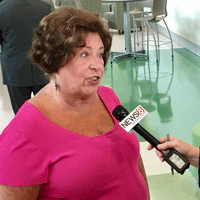The occasion was a briefing organized immediately after the state education commissioner’s August 15 “back to school” forum for district superintendents and top administrators. Organized by the What Will Our Children Lose (WWOCL) Coalition, the event served as a call to action by lawmakers and the governor before the first day of classes. Members of AFT Connecticut-affiliated unions were joined by their colleagues in the Connecticut Education Association (CEA) at Maloney High School in Meriden to ensure that teachers’ voices were heard.
Stephen McKeever (right), a science teacher at Woodrow Wilson Middle School in Middletown, wanted state elected leaders to recognize the consequences of failing to generate new revenues to meet students’ needs.
“Districts cannot absorb millions of dollars by simply cutting back on supplies,” said McKeever, who serves both our Middletown Federation of Teachers and AFT Connecticut as a vice president. “District leaders will be forced to lay off teachers. That means larger class sizes and less individualized attention that struggling students so desperately need,” he added.
McKeever told the crowd that students would ultimately pay the price for politicians refusing to “find ways to bring money into our state” in order to support local schools. He closed his remarks by urging the governor and lawmakers to “find new revenue sources that will benefit our citizens.”
Click here to watch the full WWOCL briefing.
Just three days after the event, Governor Dannel P. Malloy amended an earlier executive order that had initially directed $515 million in cuts to Education Cost Sharing (ECS) funds. While his revised plan restored resources to Alliance Districts — like Middletown — which serve large populations of students struggling with poverty, many of their services still face the threat of elimination.
 Marianne Maloney (left), a math teacher at New Haven Academy, also attended the briefing to make sure policymakers understood what choosing austerity over investment would mean for all Connecticut’s children. As an Alliance District, the Elm City’s schools are now facing a less dire series of cuts — but her community’s families still face an uncertain future.
Marianne Maloney (left), a math teacher at New Haven Academy, also attended the briefing to make sure policymakers understood what choosing austerity over investment would mean for all Connecticut’s children. As an Alliance District, the Elm City’s schools are now facing a less dire series of cuts — but her community’s families still face an uncertain future.“We’re fighting to keep the doors open for all our students,” Maloney, who serves as chief steward for our New Haven Federation of Teachers, told a reporter covering the event. “Politicians in Hartford need to know that decisions they make — or fail to — have a ripple effect on communities all across the state,” she added.
Referring to the ongoing stalemate that has left Connecticut without a permanent plan since July 1, Maloney said “our students deserve more than just ‘any’ state budget. They deserve a ‘fair share’ budget that invests in a quality public education for all.”
The governor claimed in late June when signing his initial executive order that the ECS resource cuts were part of a short-term response to “legislative inaction on a budget.” The deadlock has continued since, as lawmakers from both parties have been unable to agree on how to plug a nearly $2 billion deficit for the current fiscal year.
Click here for press reporting on the impact of the budget impasse as students return to school this week.
 David Hayes (right), a 5th grade teacher at Edgewood Elementary School in Bristol, was also on hand at the briefing to share concerns about how austerity proposals would impact his community. The restoration of their Alliance District funds is but a temporary reprieve from further reductions that threaten long term damage in the absence of a permanent and fair state budget.
David Hayes (right), a 5th grade teacher at Edgewood Elementary School in Bristol, was also on hand at the briefing to share concerns about how austerity proposals would impact his community. The restoration of their Alliance District funds is but a temporary reprieve from further reductions that threaten long term damage in the absence of a permanent and fair state budget.“We have already had five teachers cut, all at our high school,” Hayes told reporters at the briefing. Referring to the initial ECS reductions proposed by the governor, he added that “if these cuts go through, that will go into a dozen, at least.”
“Our students will suffer first when their opportunities to learn are impacted,” added Hayes, the president of our Bristol Federation of Teachers and an AFT Connecticut vice president. “Then everyone loses when we all bear the long-term costs of having failed to appropriately teach and support future generations,” he said.
Click here for press reporting on the WWOCL briefing that includes all three union leaders.
The briefing followed ongoing advocacy by our union, working together with other public education stakeholders, to move elected officials to resolve a historically inadequate funding system. Members in June joined district leaders to urge the creation of the Connecticut Achievement and Resource Equity in Schools (CARES) Commission to provide ongoing analysis and recommendations to support student learning.
Click here to watch a capitol news briefing where the CARES Commission was initially proposed.


